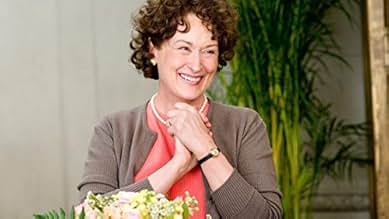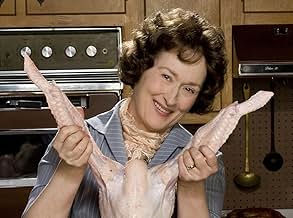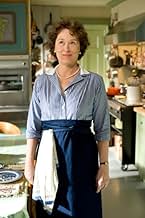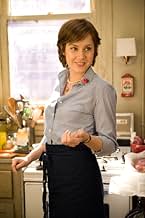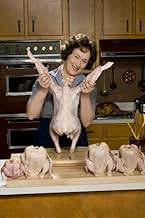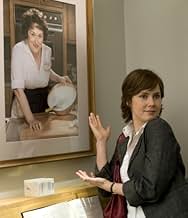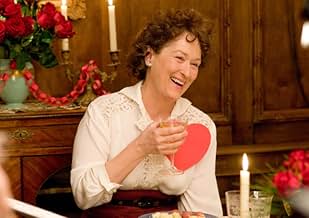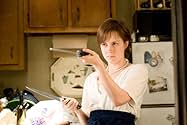Julia Childs Geschichte über ihren Einstieg in den Kochberuf ist mit der Herausforderung der Bloggerin Julie Powell aus dem Jahr 2002 verknüpft, alle Rezepte im ersten Buch von Child zu koch... Alles lesenJulia Childs Geschichte über ihren Einstieg in den Kochberuf ist mit der Herausforderung der Bloggerin Julie Powell aus dem Jahr 2002 verknüpft, alle Rezepte im ersten Buch von Child zu kochen.Julia Childs Geschichte über ihren Einstieg in den Kochberuf ist mit der Herausforderung der Bloggerin Julie Powell aus dem Jahr 2002 verknüpft, alle Rezepte im ersten Buch von Child zu kochen.
- Für 1 Oscar nominiert
- 26 Gewinne & 48 Nominierungen insgesamt
Crystal McCreary
- Ernestine
- (as Crystal Noelle)
Handlung
WUSSTEST DU SCHON:
- WissenswertesDuring the Valentine's Day dinner, one of the guests asks Julia and Paul if they were spies in the war. Both of them deny this. At the time the modern half of the film was set (2002), the Childs' wartime files had not yet been declassified, but by the time the film itself was made (2009), their records had been made public and it was revealed that Julia had served as a top-secret researcher for the OSS. The filmmakers elected to go only with facts that were established knowledge in 2002, but the spy conversation was thrown in as a sly nod toward the later revelation.
- PatzerThe film has Judith Jones stand Julie Powell up due to bad weather. Jones told the Boston Globe in August 2009 that, in fact, she had wanted to meet Julie "because I wasn't sure how you put a blog together and I also wanted to talk about recipe rights", but canceled because "Julia Child looked at her blog and didn't think Julie was a serious cook. There were all these four-letter words - that isn't how you describe food if you care and if you're a good writer. Julia thought we shouldn't have anything to do with it."
- Zitate
Paul Child: What is it that you *really* like to do?
Julia Child: Eat!
- VerbindungenFeatured in Oscar 2009 - Die Academy Awards (2009)
- SoundtracksPsycho Killer
Written by David Byrne, Chris Frantz (as Christopher Frantz) and Tina Weymouth
Performed by Talking Heads
Courtesy of Warner Bros. Records Inc.
By Arrangement with Warner Music Group Film & TV Licensing
Ausgewählte Rezension
The good parts of "Julie and Julia" are so darn strong, beautiful, and new that J&J becomes an instant classic. Grateful audiences are going to be laughing and crying and being inspired by this movie for a long, long time. The Julie portion is the weaker of the two, but not so weak that it sinks the film.
Meryl Streep as Julia Child is one of the most endearing, arresting performances ever. That the real Julia Child and her groupies irritate me no end in no way interfered with my appreciation of Streep's amazing characterization. I laughed and cried several times, I was so engaged in the cinematic Streep/Child's story.
Streep's chemistry with Stanley Tucci as Paul Child, Julia's husband, is breathtaking. No attempt is made to make Streep or Tucci conventionally attractive. No attempt is made to make them look young and dewy – they weren't – Julia married Paul when she was in her thirties and he was ten years older. Julia is tall; Paul is short; Julia is loud; Paul is bald, quiet and retiring. It is implied that they can't have children. They don't share conventionally romantic movie moments; they don't "meet cute," there's no candlelight, no slow dances, no full frontal nudity, no vulgar language (with one hilarious exception involving cannelloni).
All Paul and Julia do is share the drudgery and rewards of working life: hers as a cook, his as a state department official. The key to Streep and Tucci's chemistry is that they portray two characters who love each other. Watching a loving, married couple in a marriage that works is one of the great, and sadly rare, pleasures of this film. Steep and Tucci are every bit as charismatic a couple as Tracy and Hepburn. Jane Lynch is also brilliant in a small role as Julia's sister.
The Julia segments take place in post-war Paris, and the Paris of this film, one of elegant cafes, haute couture and vintage cars, is someplace we all wished we lived (except for the ever-present cigarette smoke.) No matter how you feel about cooking, the film gets you to care about Julia's slowly being drawn into her destiny as one of the legendary chefs of all time. You also care about, and respect, Paul, his career and its ups and downs in the McCarthy era, and his support of his wife.
The Julie Powell portion of the movie is the weaker portion. I really like the film's structure of switching back and forth between contemporary Queens and post-war Paris, contrasting a career woman's attempt to cook all of Julia Child's recipes with Julia Child herself, before she became famous. I just think that the film fails its own structure by simply not making the Julie Powell portion as interesting as the Julia Child portion. Some have complained that Queens is depicted as being too dismal, and Paris too elegant. It's more than that, though.
I think Ephron, a brilliant filmmaker, drops the ball with Julie Powell because she never engages the tough questions about Powell's experiment. Was Powell just someone eager for fame in the Warhol era of "Everyone is famous for fifteen minutes"? Was Powell parasitizing Child's fame? Was Powell a bad wife to her husband as she obsessed on completing her self assigned task? Have blogs killed quality writing? Was Julia Child correct in her condemnation of Powell? I am not saying that the answer to any of the above questions is "Yes." I'm not bashing Julie Powell. I'm saying that by not engaging them, Ephron made the Julie portion of the film simply not as interesting as it could have been had these very real questions been engaged. Instead, Ephron tries to turn Julie into a cute, bland Meg Ryan character, and it never works, not for an instant. When Powell has lunch with her career gal friends, her friends are such Gordon Gecko style sharks that we care less for Powell for being so needy as to want to impress them. The absolute worst scene in the movie comes when Powell, who has never been depicted as feeling happy or fulfilled, not with her job, not with her husband, not with her home life, plays 65 answering machine messages from agents, editors, and publishers who want to make her famous. As these messages play, she has sex with her husband, and her husband's comment lets us know that this is the first time in a long while that he has experienced satisfaction from his wife.
The message of that scene is so tawdry, it cheapens the glow created by the Julia portion of the film, that shows Julia Child achieving satisfaction *before she ever becomes famous*. Julia *loved* cooking. Julia *loved* her husband. Yes, she celebrates when Knopf wants to publish her book, but she is so divorced from the rat race that she doesn't even know how to pronounced "Knopf" – whether the initial K is silent.
Julie Powell is depicted as needing fame to feel good about herself, and the movie never interrogates that. Had it done so, the Julie segments would have been as interesting as the Julia ones.
In any case, this is a great film that will enjoy a much deserved embrace by its fans.
Meryl Streep as Julia Child is one of the most endearing, arresting performances ever. That the real Julia Child and her groupies irritate me no end in no way interfered with my appreciation of Streep's amazing characterization. I laughed and cried several times, I was so engaged in the cinematic Streep/Child's story.
Streep's chemistry with Stanley Tucci as Paul Child, Julia's husband, is breathtaking. No attempt is made to make Streep or Tucci conventionally attractive. No attempt is made to make them look young and dewy – they weren't – Julia married Paul when she was in her thirties and he was ten years older. Julia is tall; Paul is short; Julia is loud; Paul is bald, quiet and retiring. It is implied that they can't have children. They don't share conventionally romantic movie moments; they don't "meet cute," there's no candlelight, no slow dances, no full frontal nudity, no vulgar language (with one hilarious exception involving cannelloni).
All Paul and Julia do is share the drudgery and rewards of working life: hers as a cook, his as a state department official. The key to Streep and Tucci's chemistry is that they portray two characters who love each other. Watching a loving, married couple in a marriage that works is one of the great, and sadly rare, pleasures of this film. Steep and Tucci are every bit as charismatic a couple as Tracy and Hepburn. Jane Lynch is also brilliant in a small role as Julia's sister.
The Julia segments take place in post-war Paris, and the Paris of this film, one of elegant cafes, haute couture and vintage cars, is someplace we all wished we lived (except for the ever-present cigarette smoke.) No matter how you feel about cooking, the film gets you to care about Julia's slowly being drawn into her destiny as one of the legendary chefs of all time. You also care about, and respect, Paul, his career and its ups and downs in the McCarthy era, and his support of his wife.
The Julie Powell portion of the movie is the weaker portion. I really like the film's structure of switching back and forth between contemporary Queens and post-war Paris, contrasting a career woman's attempt to cook all of Julia Child's recipes with Julia Child herself, before she became famous. I just think that the film fails its own structure by simply not making the Julie Powell portion as interesting as the Julia Child portion. Some have complained that Queens is depicted as being too dismal, and Paris too elegant. It's more than that, though.
I think Ephron, a brilliant filmmaker, drops the ball with Julie Powell because she never engages the tough questions about Powell's experiment. Was Powell just someone eager for fame in the Warhol era of "Everyone is famous for fifteen minutes"? Was Powell parasitizing Child's fame? Was Powell a bad wife to her husband as she obsessed on completing her self assigned task? Have blogs killed quality writing? Was Julia Child correct in her condemnation of Powell? I am not saying that the answer to any of the above questions is "Yes." I'm not bashing Julie Powell. I'm saying that by not engaging them, Ephron made the Julie portion of the film simply not as interesting as it could have been had these very real questions been engaged. Instead, Ephron tries to turn Julie into a cute, bland Meg Ryan character, and it never works, not for an instant. When Powell has lunch with her career gal friends, her friends are such Gordon Gecko style sharks that we care less for Powell for being so needy as to want to impress them. The absolute worst scene in the movie comes when Powell, who has never been depicted as feeling happy or fulfilled, not with her job, not with her husband, not with her home life, plays 65 answering machine messages from agents, editors, and publishers who want to make her famous. As these messages play, she has sex with her husband, and her husband's comment lets us know that this is the first time in a long while that he has experienced satisfaction from his wife.
The message of that scene is so tawdry, it cheapens the glow created by the Julia portion of the film, that shows Julia Child achieving satisfaction *before she ever becomes famous*. Julia *loved* cooking. Julia *loved* her husband. Yes, she celebrates when Knopf wants to publish her book, but she is so divorced from the rat race that she doesn't even know how to pronounced "Knopf" – whether the initial K is silent.
Julie Powell is depicted as needing fame to feel good about herself, and the movie never interrogates that. Had it done so, the Julie segments would have been as interesting as the Julia ones.
In any case, this is a great film that will enjoy a much deserved embrace by its fans.
- Danusha_Goska
- 10. Aug. 2009
- Permalink
Top-Auswahl
Melde dich zum Bewerten an und greife auf die Watchlist für personalisierte Empfehlungen zu.
Everything New on Paramount+ in December
Everything New on Paramount+ in December
Freshen up your Watchlist with the latest selection of streaming movies and TV shows coming to Paramount+ this month.
Details
- Erscheinungsdatum
- Herkunftsland
- Sprachen
- Auch bekannt als
- Julie y Julia
- Drehorte
- Hoboken Railway Station, Hoboken, New Jersey, USA(Julia child scenes)
- Produktionsfirmen
- Weitere beteiligte Unternehmen bei IMDbPro anzeigen
Box Office
- Budget
- 40.000.000 $ (geschätzt)
- Bruttoertrag in den USA und Kanada
- 94.125.426 $
- Eröffnungswochenende in den USA und in Kanada
- 20.027.956 $
- 9. Aug. 2009
- Weltweiter Bruttoertrag
- 129.540.522 $
- Laufzeit2 Stunden 3 Minuten
- Farbe
- Sound-Mix
- Seitenverhältnis
- 1.85 : 1
Zu dieser Seite beitragen
Bearbeitung vorschlagen oder fehlenden Inhalt hinzufügen








